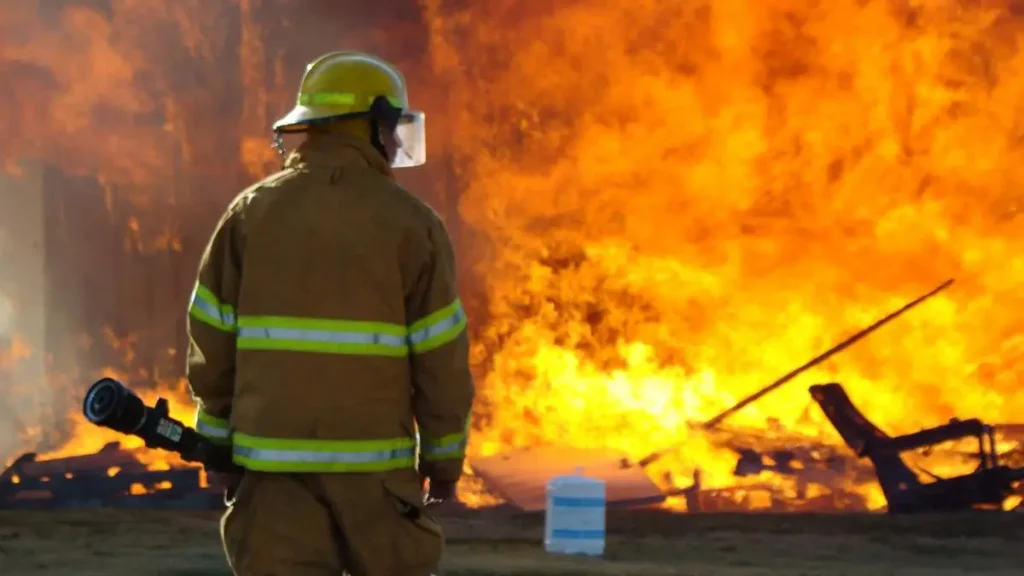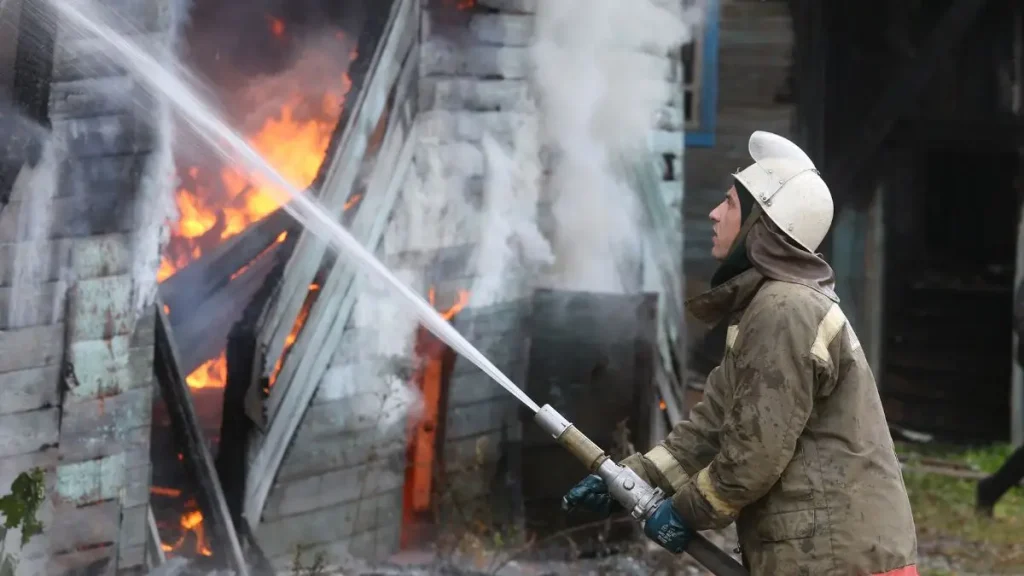Mobile Home Damaged After Fire Breaks Out in Lengby, Minnesota
When I read the dispatch I felt that familiar pit in my stomach — a late-night house fire in a small town is always urgent. On Wednesday, October 29, at about 8:43 p.m., the Polk County Sheriff’s Office was called to 401 East Lillo Street in Lengby after reports of a mobile home on fire.
By the time deputies and firefighters arrived the home was fully engulfed. Thankfully, everyone who lived there was already outside; there were no injuries reported. Hearing that all occupants were safe is the single most important detail in any scene like this.
Fosston Fire led the response and asked Bagley Fire Department for mutual aid to help bring the blaze under control. Essentia Ambulance and the Minnesota State Fire Marshal’s Office also responded — the latter now handling the investigation into what caused the fire
Fire Crews Arrive to Find Home Fully Engulfed in Flames

When fire crews from Fosston and Bagley arrived at the scene, flames had already taken over the entire structure. According to a report by KVRR, the home was “fully engulfed” when first responders got there — the kind of sight firefighters dread because it means the fire has already reached a point where saving the structure is nearly impossible.
Even then, the teams moved quickly. Rural departments like Fosston and Bagley rely on mutual aid because resources can be limited — water sources may be farther away, and manpower is often stretched thin. That night, coordination made the difference between a total tragedy and a contained disaster.
The crews battled the flames for hours, containing what they could while protecting nearby properties. Nights like this test not just skill, but grit — especially when temperatures drop and the nearest backup is miles out.
Community Relief as All Residents Escape Unharmed
According to KROX AM, everyone inside the mobile home made it out safely before firefighters arrived. That single line — “all occupants were outside of the home” — carries more weight than any damage report ever could.
In small towns like Lengby, news travels fast. Within minutes, neighbors and friends were checking in, calling, offering a place to stay. When a home burns down in a community of barely a few hundred people, it’s not just an address that’s lost — it’s part of the town’s rhythm.
The quick evacuation likely came down to awareness and working smoke alarms — something too many households overlook until it’s too late. If you’re reading this at home, take this as your reminder: test those alarms tonight. It takes ten seconds and can save your life.
If you like staying updated on verified local incidents and safety tips, there’s a quiet space online where residents share real-time alerts and fire safety reminders. It’s a WhatsApp-based community where people help each other stay informed — worth checking out if you live in a rural area.
Why Mobile Home Fires Spread So Fast?
Mobile homes are especially vulnerable once a fire starts. Many are built with lightweight materials that ignite quickly and burn hotter than traditional framing. Add to that the tight spacing of rooms and limited exits, and you get a structure that can turn deadly in minutes.
National Fire Protection Association (NFPA) data shows that fires in manufactured or mobile homes are nearly twice as likely to result in fatalities compared to site-built homes. The reason isn’t just materials — it’s time. Fires grow exponentially faster in confined spaces, and response times in rural areas can be longer.
Living in a mobile home doesn’t mean you’re helpless — but it does mean you have to plan smarter. Two working smoke alarms, an escape plan, and a habit of keeping heating equipment clear can make all the difference.
Just last week, a similar community response was seen after a Monroe house fire displaced six people and eight pets — moments like these remind us how neighbors rally when everything feels lost.
What You Can Learn from the Lengby Fire?
If this fire teaches us anything, it’s that prevention is always easier than recovery.
Start simple.
- Check your smoke detectors once a month.
- Keep heaters and stoves at least three feet from anything flammable.
- Never run extension cords under rugs or furniture.
- If you live outside city limits, make sure your address is visible at night so first responders can find you fast.
These sound like small things, but in a fire, small things decide everything. The Lengby fire could have ended very differently if not for quick thinking and fast evacuation.
If you’re in a rural area, take a few minutes this week to talk with your family about what you’d do if a fire started at night. It’s uncomfortable to imagine — but it’s far better than being unprepared.
The Bloomingburg home fire investigation showed a similar pattern — quick thinking and early evacuation made all the difference before crews arrived. These stories drive home one truth: awareness isn’t fear—it’s prevention.
Investigation and What Happens Next

The Minnesota State Fire Marshal’s Office is leading the investigation into what caused the Lengby blaze. As of now, no official details have been released, but fires like this often lead to renewed community discussions about safety — and sometimes, better preparedness.
For the homeowners, recovery starts now. The structure may be gone, but with everyone safe, the focus turns to rebuilding — both physically and emotionally. In towns like Lengby, that process rarely happens alone. Neighbors rally, local businesses chip in, and word spreads fast when someone needs a hand.
If you’re part of that wider circle — a nearby resident, friend, or even just a reader who cares — consider donating to local fire departments or community relief groups. Every call they answer starts with the same hope: that everyone gets out alive. This time, that hope became reality.
Lessons for Rural and Small-Town Communities
Living in a place like Lengby has its charm — wide skies, quiet nights, and neighbors who actually know your name. But small towns also face real challenges when disaster strikes. Fires here don’t just test homeowners; they test the whole system — response time, equipment, water supply, and coordination across miles.
When I talk with rural firefighters, one theme always comes up: preparedness is personal. In big cities, help arrives in minutes. In towns like Lengby, those first few minutes belong to you — your alarms, your awareness, your plan.
This fire is a reminder that community safety isn’t only about sirens and trucks. It starts inside our homes: safe heating habits, cleared driveways for emergency access, and neighbors looking out for each other. Rural safety is built one decision at a time, long before the first spark.
A few days ago, a South Miami-Dade fire reminded us how unpredictable these incidents can be — but also how every response adds to what we learn as a community.
Key Takeaways from the Lengby Mobile Home Fire
- All residents escaped safely, thanks to fast action and working smoke alarms.
- Fosston and Bagley Fire Departments worked together under mutual aid — a model that keeps small towns protected even with limited resources.
- The cause remains under investigation by the Minnesota State Fire Marshal’s Office.
- Mobile homes burn faster, and residents must take extra precautions with heating and wiring.
- Preparedness and awareness made the difference between survival and tragedy.
This isn’t just a story about one home in Lengby — it’s a reminder for every rural household. Fire can happen anywhere, but readiness turns loss into survival.
So before you close this tab, ask yourself one thing: Would you and your family know what to do if a fire started tonight?
If you hesitated for even a second, that’s your cue. Test your alarms. Review your escape plan. Talk about it at dinner. Because safety isn’t luck — it’s preparation.
For more verified local fire updates and home safety insights, visit Build Like New— we track what matters most: safety, community, and rebuilding stronger.
Disclaimer: Details in this article are based on official reports and verified local sources available at the time of publication. The investigation into the Lengby mobile home fire is ongoing, and updates may change as new information emerges. Readers are encouraged to follow local authorities and fire departments for the latest verified updates.


